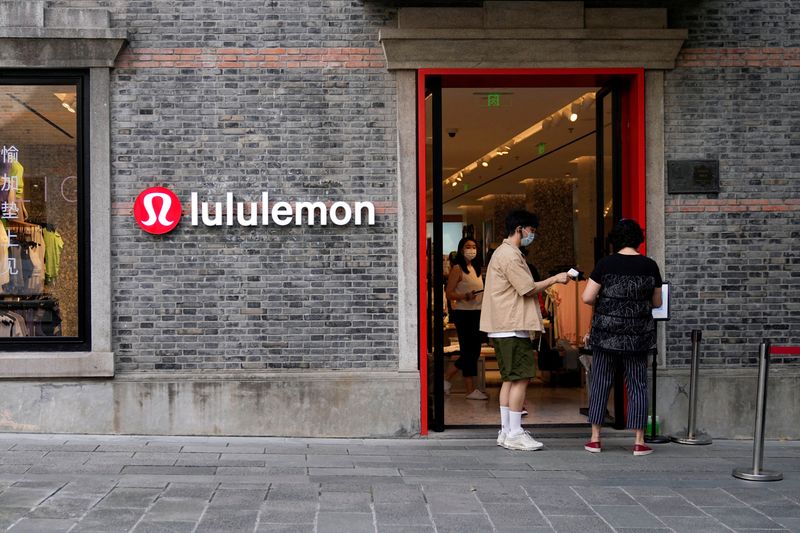By Casey Hall
SHANGHAI (Reuters) - Premium sportswear brands are enjoying robust growth in China as they take to directly courting their main customers, posing yet another setback to megabrands Nike (NYSE:NKE) and Adidas (OTC:ADDYY) as they grapple with local competitors in the $55 billion sportswear market.
Sportswear is a rare bright spot in China's sluggish consumer market, as health and wellness have become a priority for aspirational, middle class consumers post-pandemic, with many people getting into activities such as yoga, hiking and running for the first time.
The market, the world's biggest after the United States, is seen growing 7% this year to $59 billion, outpacing the 0.8% forecast growth in non-sportswear apparel and footwear, according to data from Euromonitor.
While this should be good news for market leaders Nike, Adidas, Anta and Li Ning, it's even better news for pricier brands such as Lululemon (NASDAQ:LULU) and niche sneakers makers On and Hoka, all who have favoured using social media influencers and community-targeted marketing over the celebrity-led campaigns that bigger brands have traditionally relied on.
"A lot of Chinese women are new to sport, they feel a bit intimidated," said Ning Zheng, 33, a fitness model with several thousand followers on the Instagram-like platform Xiaohongshu who said she has partnered with the majority of international sports brands operating in China in some capacity.
"But if other people from their yoga studio or running groups, or someone they relate to online, is wearing a brand, they believe it can be good for them too," she added.
On and Hoka are relative newcomers to the market, which means their growth will naturally exceed that of more established rivals. But the more share they take out of the market, the less there is left for everyone else.
On doesn’t break out China numbers but its Asia Pacific sales growth jumped 69% in the first quarter and accounted for over 10% of global revenue for the first time. Its co-CEO said on a recent earnings call the company expects China alone to account for 10% of overall revenue before long.
By comparison, Nike’s sales in the Greater China market rose 4.5% in its most recent quarter, though off a much higher base than smaller rivals. It reported selling around $7 billion across footwear and apparel in Greater China in its 2023 fiscal year. Adidas grew its China business by 8% in its first quarter.
"As the market matures, growth will increasingly favour niche categories and niche brands," said HSBC consumer analyst Lina Yan.
Compared to other premium brands, Lululemon is a veteran with a decade-old presence in China. It took a slow-and-steady approach to expansion, opening its 100th store last year to coincide with its 10th anniversary, but has since ramped up its strategy, saying it intends to have 220 stores by 2026.
The Canadian yoga wear maker, which relies largely on targeted marketing, reported a 45% growth in China, its second-largest globally, in the first quarter, countering a slackening demand in the United States where sales grow just 2%. Its net sales in China reached almost $1 billion last year.
'SOUL SEARCHING'
Chinese consumers, particularly millenials and the even younger Gen Z, appear to be finally jumping on the global health and fitness trend that has been popular for years, using sport as a way to find themselves, analysts say.
Aspirational brands Amer Sports' outdoor wear label Arc'teryx and Lululemon - dubbed by many Chinese consumers as the "Hermes of yoga" are benefitting, because many first-time sports enthusiasts believe they are the most suitable brand for the specific activity they are looking to pursue.
"I think young people in China are finding themselves through consumption, through sports and hobbies, by trying frisbee, cycling or yoga and making that part of their identity," said Yaling Jiang, founder of research and strategy consultancy ApertureChina.
"There's a lot of soul searching going on for these consumers, but it explains why they will pay a premium for brands they feel are a good fit."

Premium yoga brand Vuori opened its first store in Shanghai last month. Authentic Brands Group, which recently opened a flagship for Reebok in Shanghai, is also looking to expand the presence of brands specialising in more niche sports, from surfing and hiking to snow sports.
"We really believe the sky is the limit for these brands," said Josh Perlman, Authentic Brands Group's executive vice president for lifestyle in Greater China.